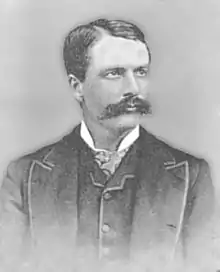George Woodward Warder
George Woodward Warder (May 20, 1848 – February 8, 1907)[1] was a poet, philosopher and author from Missouri, USA.
George Woodward Warder | |
|---|---|
 George Woodward Warder in about 1880 | |
| Born | May 20, 1848 Richmond, Missouri |
| Died | February 8, 1907 (aged 58) |
| Occupation | Lawyer, poet, author, philosopher |
| Nationality | American |
Life
Warder was a student at the University of Missouri. At the age of eighteen, he was practicing law. He later became a successful lawyer with an interest in banking. In 1878, Warder moved to Kansas City, Missouri, continuing his practice of law as well as other financial enterprises. He invested in real estate and construction.[2]
Books
Warder was also a poet and philosopher. He wrote many books, such as Poetic Fragments, or, College Poems (1873), Eden Dell, or, Love's Wanderings and other Poems (1878), Utopian Dreams and Lotus Leaves (1885) and After Which All Things, or, Footprints and Shadows (1895).[1]
Warder also developed his own cosmology theory. He authored The New Cosmogony (1898), Invisible Light, or Electric Theory of Creation (1899), The Cities of the Sun (1901), The Stairway to the Stars (1902), The Universe a Vast Electric Organism (1903). Warder believed that the universe was an electrical creation and that electricity plays a more important role in the universe than is generally accepted. His views can be seen as a predecessor to plasma cosmology.[3][4]
References
- "George Woodward Warder (1848-1907) Papers (KC0131)". University of Missouri-Kansas City. State Historical Society of Missouri. Archived from the original on 2012-04-02.
- "George Woodward Warder". Strangers to Us All: Lawyers and Poetry. Retrieved 2019-06-21.
- Electric Universe theory - Electric Universe
- Plasma Cosmology